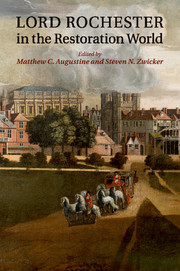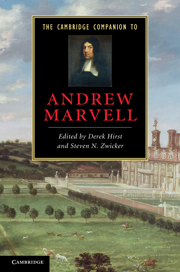49 results
Chapter 5 - Lord Rochester
-
-
- Book:
- Lord Rochester in the Restoration World
- Published online:
- 05 May 2015
- Print publication:
- 23 April 2015, pp 79-98
-
- Chapter
- Export citation
Copyright page
-
- Book:
- Lord Rochester in the Restoration World
- Published online:
- 05 May 2015
- Print publication:
- 23 April 2015, pp iv-iv
-
- Chapter
- Export citation
Contents
-
- Book:
- Lord Rochester in the Restoration World
- Published online:
- 05 May 2015
- Print publication:
- 23 April 2015, pp v-vi
-
- Chapter
- Export citation

Lord Rochester in the Restoration World
-
- Published online:
- 05 May 2015
- Print publication:
- 23 April 2015
Contributors
-
- Book:
- Lord Rochester in the Restoration World
- Published online:
- 05 May 2015
- Print publication:
- 23 April 2015, pp vii-viii
-
- Chapter
- Export citation
Note on texts and sources
-
- Book:
- Lord Rochester in the Restoration World
- Published online:
- 05 May 2015
- Print publication:
- 23 April 2015, pp x-x
-
- Chapter
- Export citation
Acknowledgements
-
- Book:
- Lord Rochester in the Restoration World
- Published online:
- 05 May 2015
- Print publication:
- 23 April 2015, pp ix-ix
-
- Chapter
- Export citation
Chapter 1 - Introduction
-
-
- Book:
- Lord Rochester in the Restoration World
- Published online:
- 05 May 2015
- Print publication:
- 23 April 2015, pp 1-16
-
- Chapter
- Export citation
Index
-
- Book:
- Lord Rochester in the Restoration World
- Published online:
- 05 May 2015
- Print publication:
- 23 April 2015, pp 291-294
-
- Chapter
- Export citation
Cambridge Companions to. . .
-
- Book:
- The Cambridge Companion to Andrew Marvell
- Published online:
- 28 March 2011
- Print publication:
- 23 December 2010, pp 225-228
-
- Chapter
- Export citation
1 - Introduction
-
-
- Book:
- The Cambridge Companion to Andrew Marvell
- Published online:
- 28 March 2011
- Print publication:
- 23 December 2010, pp 1-7
-
- Chapter
- Export citation
Frontmatter
-
- Book:
- The Cambridge Companion to Andrew Marvell
- Published online:
- 28 March 2011
- Print publication:
- 23 December 2010, pp i-xvi
-
- Chapter
- Export citation
Index
-
- Book:
- The Cambridge Companion to Andrew Marvell
- Published online:
- 28 March 2011
- Print publication:
- 23 December 2010, pp 220-224
-
- Chapter
- Export citation

The Cambridge Companion to Andrew Marvell
-
- Published online:
- 28 March 2011
- Print publication:
- 23 December 2010
D. F. McKenzie and Maureen Bell. A Chronology and Calendar of Documents Relating to the London Book Trade, 1641–1700. Vols. 1–3. Oxford: Oxford University Press, 2005. Pp. 1569. $480.00 (cloth).
-
- Journal:
- Journal of British Studies / Volume 46 / Issue 1 / January 2007
- Published online by Cambridge University Press:
- 21 December 2012, pp. 177-179
- Print publication:
- January 2007
-
- Article
- Export citation
8 - Irony, Disguise and Deceit: What Literature Teaches us about Politics
-
-
- Book:
- British Political Thought in History, Literature and Theory, 1500–1800
- Published online:
- 22 September 2009
- Print publication:
- 23 November 2006, pp 145-167
-
- Chapter
- Export citation
Frontmatter
-
- Book:
- The Cambridge Companion to John Dryden
- Published online:
- 28 May 2006
- Print publication:
- 20 May 2004, pp i-xiv
-
- Chapter
- Export citation
Series List
-
- Book:
- The Cambridge Companion to John Dryden
- Published online:
- 28 May 2006
- Print publication:
- 20 May 2004, pp 301-303
-
- Chapter
- Export citation
15 - Dryden and the problem of literary modernity
- from Part 3 - Courting and complying with danger
-
-
- Book:
- The Cambridge Companion to John Dryden
- Published online:
- 28 May 2006
- Print publication:
- 20 May 2004, pp 280-285
-
- Chapter
- Export citation
Part 1 - Pleasures of the imagination
-
- Book:
- The Cambridge Companion to John Dryden
- Published online:
- 28 May 2006
- Print publication:
- 20 May 2004, pp -
-
- Chapter
- Export citation



